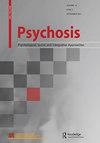The effects of a specialized staff training on trauma-sensitivity in professionals working with patients with a psychotic disorder: A pilot study
IF 1
4区 医学
Q4 PSYCHIATRY
Psychosis-Psychological Social and Integrative Approaches
Pub Date : 2021-12-05
DOI:10.1080/17522439.2021.1994635
引用次数: 1
Abstract
ABSTRACT Background Studies show that the trauma-sensitivity of professionals working with patients with psychosis is insufficient. As a result, trauma-related problems remain undetected and untreated, which may impede recovery in this group. This study explored the effects of a specialised staff training on six trauma-sensitivity factors (i.e. knowledge, credibility, expected burden, harm expectancy, diagnostic competency and organizational support), self-reported trauma-sensitive behaviour and objective indicators of trauma-sensitive behaviour in medical files. Method Professionals (N = 56) rated the six trauma-sensitivity factors and their own trauma-sensitive behaviour at pre-training, post-training and at 6- and 12-months follow-up. Changes in indicators of trauma-sensitive behaviours were assessed by a review of medical files (N = 97). Results The specialized training increased knowledge, crediblity and experienced diagnostic compentence. The training decreased burden and harm expectancies, and enhanced self-reported trauma-sensitive behaviour. However, this positive change could not be objectified by indicators of trauma-sensitive behaviour in medical files. Discussion These findings support the notion that specialised training has a positive effect on increasing trauma-sensitivity and decreasing burden and harm expectancies, but not necessarily on observable trauma-sensitive behaviour. In addition to training staff, structural implementation and organisational support are argued to be essential to attain actual behaviour change.专业人员对精神障碍患者创伤敏感性培训的效果:一项试点研究
背景研究表明,与精神病患者一起工作的专业人员的创伤敏感性不足。因此,与创伤有关的问题仍未被发现和治疗,这可能会阻碍这一群体的康复。本研究探讨了专业人员培训对医疗档案中六个创伤敏感因素(即知识、可信度、预期负担、预期伤害、诊断能力和组织支持)、自我报告的创伤敏感行为和创伤敏感行为客观指标的影响。方法对56名专业人员在训练前、训练后、6个月和12个月随访时对6项创伤敏感因素和自身创伤敏感行为进行评分。通过对医疗档案的回顾评估创伤敏感行为指标的变化(N = 97)。结果专业培训提高了知识水平、可信度和经验诊断能力。训练降低了负担和伤害预期,增强了自我报告的创伤敏感行为。然而,这种积极的变化不能通过医疗档案中创伤敏感行为的指标客观化。这些发现支持了这样一种观点,即专业培训对增加创伤敏感性和减少负担和伤害预期有积极作用,但不一定对可观察到的创伤敏感性行为有积极作用。除了培训工作人员外,结构性实施和组织支持被认为是实现实际行为改变的必要条件。
本文章由计算机程序翻译,如有差异,请以英文原文为准。
求助全文
约1分钟内获得全文
求助全文
来源期刊
CiteScore
2.20
自引率
8.30%
发文量
36

 求助内容:
求助内容: 应助结果提醒方式:
应助结果提醒方式:


